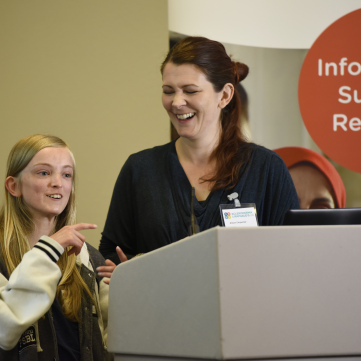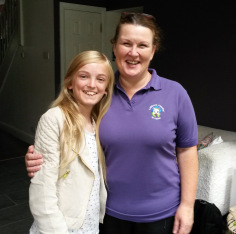Scleroderma blog by Alison Juggler
Scleroderma is a rare disease that affects the immune system. Your body starts to attack healthy tissue and produce excess collagen, affecting the skin, joints, blood vessels, tendons and internal organs (eek!). The resulting scarring and stiffness varies in severity, but it can be disabling and even life-threatening when you have the most serious type of of scleroderma: systemic. Yep, that’s what my daughter
A scleroderma blog called toomanyballs by Alison Juggler.
Nope, I'd never heard of it either, until my daughter Jasmine was diagnosed with it at the age of 5. And there began a journey of discovery, worry, treatments, tests and uncertainty that has changed our lives… in some ways, strangely, for the better.
Scleroderma is a rare disease that affects the immune system. Your body starts to attack healthy tissue and produce excess collagen, affecting the skin, joints, blood vessels, tendons and internal organs (eek!). The resulting scarring and stiffness varies in severity, but it can be disabling and even life-threatening when you have the most serious type of of scleroderma: systemic. Yep, that's what my daughter has.
Needless to say I was very worried when she was first diagnosed and I began to read about the disease, but we have been fortunate enough to be under the care of an amazing team at Great Ormond Street Hospital in London, and now have contact with a wonderful charity 'Scleroderma & Raynauds UK' who provide support and information to families and individuals affected by the disease, as well as raising crucial funds for research. We recently had the pleasure of speaking about our experiences to other families affected by Scleroderma at the SRUK 'Family Day'.


In some ways we're lucky that the worst part of the disease, in my daughter's case, has been the treatment: a weekly dose of a powerful immunosuppressant called 'Methotrexate'. Initially my daughter had to take this in the form of tablets. Getting a young child to swallow tablets is difficult enough, but when they taste revolting, cannot be taken with food or milk and make you feel sick for about 24 hours afterwards… it's pretty much impossible. We tried both the 'carrot' and the 'stick' approach but neither worked, and Friday evenings ('medicine day') became an exhausting and heart-wrenching battle that affected the whole family.

Changing to having the drug administered via injection by one of our local 'Children's Hospital At Home Team' nurses made a huge difference. Jasmine hated the injections and it was still a battle to get her to allow the nurse to inject her, but two things changed: once the needle was in, the job was done in 5 seconds and we could relax (in contrast, she was previously taking 6 tablets so even if she managed to swallow the first one without throwing up, there were still another 5 to go!) and secondly, I was no longer the one trying to coax her into taking her medication. I could hold her in a sympathetic cuddle while the nurse did the business. That made a big difference to our relationship, and is something for which I am extremely grateful.
Methotrexate is currently the most effective drug in managing scleroderma, but as well as suppressing the immune system it suppresses pretty much everything else. Including growth. Jasmine is fairly petite (who knows whether she would have been anyway) but as she has reached an age when she should be growing (and her bone density increasing) it has been decided to give her body a rest from the usually long-term treatment. So at the moment she is off all medication (the Methotrexate was accompanied by various other drugs and required monthly blood tests to check it wasn't doing too much damage to the body's white blood cells). We still visit the hospital regularly for physio, OT, tests on her internal organs and general check-ups, but the stress of taking medication and dealing with the side-effects is thankfully not present.
Scleroderma will always be part of Jasmine's life (unless a cure is found), but I can honestly say it has made her a stronger, more communicative and more loving person than she might have been had she not been through nearly 10 years of tests, treatments and being 'different'. Our relationship is stronger, her brothers have become more empathic, and my husband and I are now more of a team as parents I think.
Some people say 'everything happens for a reason'… but I think that can be a fairly damaging thought. I would say 'everything that happens can have a purpose'. Troubles make us stronger, more compassionate, more patient and more appreciative of what we have. Scleroderma has definitely done that for Jasmine and our family.
